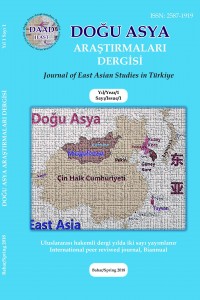Öz
The concept of “foreigner” in Chinese had always been ambiguous in its patterns and substantial semantic connotations. No matter how multitudinous and substantial they used to be, in the vast corpus of Western literature, they were matched with the single term “barbarian" for a long time. Regardless of the unique connotations of each Chinese term, the whole idea of “Chinese foreigner” was constricted to a dichotomy on the civilized-barbarian fault line. This paper argues the basic idea of the term "barbarian".
Kaynakça
- BIBLIOGRAPHY ARİSTOTLE, (1995/2009), Politics, (R. F. Stalley ed.) Oxford University Press. AGAMBEN, Giorgio (2001), Homo Sacer: Sovereign Power and Bare Life, California, Stanford University Press. - (1987), Ana Britannica, Ana Yayıncılık c.3. İstanbul. CLARK, S. R. L. (1985), “Slaves And Citizens”, Philosophy, S.60, s. 27–46. FABİAN, Johannes (1999), Zaman ve Öteki: Antropoloji Nesnesini Nasıl Oluşturur, İstanbul, Bilim ve Sanat Yayınları. FRASSETTO, Michael (2003), Encyclopedia of Barbarian Europe: Society in Transformation, California, ABC_CLIO, Inc.. GRANET, Marcel (1929), La Civilisation Chinoise, Bibliothèque de l'évolution de l'humanité. GRYGİEL, Jakup (2007), “Empires And Barbarians”, Civilization and Order, Spring (March/April) s.13–21. LİU, H. Lydia (2004), The Clash of Empires: The Invention of China in Modern World Making, Harvard University Press. HALL, Edith (2004), Inventing the Barbarian: Greek Self-definition Through Tragedy, Oxford University Press. MORGAN, Lewis Henry (1877), Ancient Society, New York, Henry Holt &Compan. MATTERN, Susan P. (2002), Rome and the Enemy: Imperial Strategy in thePrincipate, University of California Press. WARDY, Robert (2000), Aristotle in China: Language, Categories and Translation, Chambridge University Press.
Öz
Çin dilinde yabancı kavramı, semantik çağrışım ve desenleriyle
çok yönlü ve katmanlıdır. Buna karşın batı dillerinde yazılan eserlerin
oluşturduğu zengin literatür içinde Çince terimler çoğunlukla
"barbar" ile karşılanmıştır. Bunun sonucu olarak Çince terimlerin asıl
anlamları göz ardı edilmiş ve Çin'in geleneksel yabancı anlayışı,
batının uygar-barbar ikiliğine indirgenmiştir. Bu yazıda "barbarlık"
mefhumu ele alınmaktadır.
Kaynakça
- BIBLIOGRAPHY ARİSTOTLE, (1995/2009), Politics, (R. F. Stalley ed.) Oxford University Press. AGAMBEN, Giorgio (2001), Homo Sacer: Sovereign Power and Bare Life, California, Stanford University Press. - (1987), Ana Britannica, Ana Yayıncılık c.3. İstanbul. CLARK, S. R. L. (1985), “Slaves And Citizens”, Philosophy, S.60, s. 27–46. FABİAN, Johannes (1999), Zaman ve Öteki: Antropoloji Nesnesini Nasıl Oluşturur, İstanbul, Bilim ve Sanat Yayınları. FRASSETTO, Michael (2003), Encyclopedia of Barbarian Europe: Society in Transformation, California, ABC_CLIO, Inc.. GRANET, Marcel (1929), La Civilisation Chinoise, Bibliothèque de l'évolution de l'humanité. GRYGİEL, Jakup (2007), “Empires And Barbarians”, Civilization and Order, Spring (March/April) s.13–21. LİU, H. Lydia (2004), The Clash of Empires: The Invention of China in Modern World Making, Harvard University Press. HALL, Edith (2004), Inventing the Barbarian: Greek Self-definition Through Tragedy, Oxford University Press. MORGAN, Lewis Henry (1877), Ancient Society, New York, Henry Holt &Compan. MATTERN, Susan P. (2002), Rome and the Enemy: Imperial Strategy in thePrincipate, University of California Press. WARDY, Robert (2000), Aristotle in China: Language, Categories and Translation, Chambridge University Press.
Ayrıntılar
| Birincil Dil | İngilizce |
|---|---|
| Konular | Dilbilim |
| Bölüm | Makaleler |
| Yazarlar | |
| Yayımlanma Tarihi | 15 Ocak 2018 |
| Yayımlandığı Sayı | Yıl 2018 Cilt: 1 Sayı: 1 |
Doğu Asya Araştırmaları Dergisi (DAAD) I 2021 I abdurresit.karluk@hbv.edu.tr I
Bu eser Creative Commons Alıntı-Gayri Ticari-Türetilemez 4.0 Uluslararası Lisansı (CC BY-NC-ND 4.0) ile lisanslanmıştır.
This work is licensed under a Creative Commons Attribution-NonCommercial-No Derivatives 4.0 (CC BY-NC-ND 4.0) International License.


